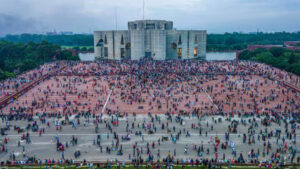Bangladesh Protest News: Former IT Minister Palak Detained at Airport; Parliament Dissolved
Dhaka Streets Calm as Army Chief Set to Meet Protest Coordinators

Dhaka, Bangladesh – The political landscape in Bangladesh witnessed significant upheaval as former Minister of Telecommunication and ICT, Zunaid Ahmed Palak, was detained at Hazrat Shahjalal International Airport. This development comes amid ongoing protests and the dissolution of the Bangladesh parliament.
Palak Detained at Airport
Former minister Zunaid Ahmed Palak, along with his two aides, arrived at the airport around 3:00 PM on Tuesday. Airport authorities, as reported by Prothom Alo, detained him, preventing him from boarding his flight. The immigration officials took him into custody amidst growing political tension in the country.
Parliament Dissolved Amidst Protests
The Bangladesh parliament was officially dissolved today, following a demand by student protest coordinators. They had called for the dissolution by 3:00 PM, pushing for the establishment of a new interim government. The protest leaders warned of a “strict programme” and urged “revolutionary students to be ready.”
India’s Response to the Crisis
In India, the political crisis in Bangladesh has garnered significant attention. Union Minister of External Affairs, S. Jaishankar, addressed the Rajya Sabha, stating that the Indian government is closely monitoring the situation, particularly concerning the status of minorities in Bangladesh. He noted, “The situation in Bangladesh is evolving,” and called for the understanding of the House.
Background of the Protests
The protests in Bangladesh erupted over a contentious 30% quota in government jobs reserved for those who fought in the 1971 India-Pakistan war. These protests escalated into a demand for the resignation of Prime Minister Sheikh Hasina. Violent clashes resulted in over 100 deaths on Sunday and six more on Monday.
Nobel Laureate Muhammad Yunus as Chief Adviser
Nobel laureate Muhammad Yunus has been appointed as the chief adviser to the interim government. Yunus, 84, is a globally recognized economist known for pioneering microfinance, a system that has helped lift many Bangladeshis out of extreme poverty. However, his relationship with Sheikh Hasina has been fraught with tension.
Yunus’s Background and Achievements
Born in 1940 in Chittagong, Yunus received his Ph.D. in economics from Vanderbilt University. He returned to Bangladesh after its liberation and headed the economics department at Chittagong University. Yunus introduced the concept of microcredit, providing small loans without collateral to entrepreneurs, which led to the creation of Grameen Bank in 1983. The bank’s success, with over $34 billion disbursed to nearly 10 million people, earned Yunus the Nobel Peace Prize in 2006.Yunus began to flirt with the idea of forming his own political party. This didn’t sit well with Hasina, who was in jail at the time, facing charges of extortion.
Controversies and Legal Battles
Yunus’s success did not come without challenges. After considering a political career, which did not sit well with Hasina, Yunus faced numerous investigations and legal challenges. These included charges of forgery, money laundering, and embezzlement. Most recently, in January, he and three officials from Grameen Telecom were sentenced to six months in prison for violating labor laws, though they were granted bail.
Global Support for Yunus
The international community has expressed concern over the judicial harassment faced by Yunus. In August last year, 160 global figures, including former US President Barack Obama and former UN Secretary-General Ban Ki-moon, signed a letter condemning the continuous judicial actions against him.
Future Outlook
With the appointment of Muhammad Yunus as the chief adviser, Bangladesh stands at a critical juncture. The interim government faces the challenge of stabilizing the political situation and addressing the demands of the protesters. As the situation unfolds, the world watches closely, hoping for a peaceful resolution to the crisis.